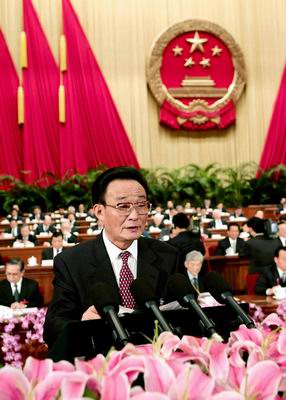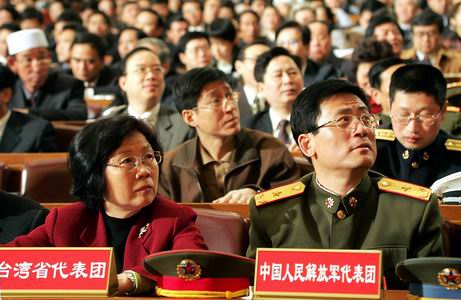
Wu Bangguo, the National People¡¯s Congress Standing
Committee chairman, delivers a working report to parliament yesterday in
Beijing. The Committee said it would focus its law-enforcement inspection on the
implementation of laws on agriculture, water resources, workers¡¯ rights, work
safety, especially in coal mines, and judicial justice.
-Xinhua

Deputies attend the third plenary session of the 10th
National People¡¯s Congress in the Great Hall of the People yesterday in Beijing.
¡ª Xinhua
China's top legislature will strengthen law-enforcement
inspection on major issues having a bearing on the country's reform, opening up
stability this year, top legislator Wu Bangguo said yesterday in Beijing.
Wu,
chairman of the Standing Committee of the National People's Congress, told an
annual parliament session that this year the NPC Standing Committee would focus
its law-enforcement inspection on the implementation of laws on agriculture,
water resources, the legitimate rights of workers, work safety, especially in
coal mines, and judicial justice.
Chinese constitution and relevant laws
endowed the parliament with the power of supervision, and law-enforcement
inspection has been an important form of supervision.
Major issues concerning
agriculture, the countryside and farmers remain to be top concern of the
government as the country is trying to feed its 1.3 billion population. Last
year, the NPC Standing Committee dispatched lawmakers' teams to 15 provincial
localities to inspect the implementation of laws and policies.
China's grain
production increased by 38.8 billion kilograms to 469.5 billion kg last year,
the first rise after years of drops.
On issues concerning water resources, Wu
said, the legislature's inspection would concentrate on the implementation of
laws on water pollution control and water, in a bid to promote the protection,
conservation and rational utilization of water resources.
According to the
Ministry of Water Resources, more than 300 million rural residents still do not
have access to or can afford safe drinking water, and 190 million others have to
drink water with excessive hazardous substances.
The government has worked
out a plan to reduce the number of rural residents who do not access to clean,
safe water by one third by 2010, and guarantee clean, safe water to the 300
million rural residents by 2020.
The npc Standing Committee's planned
inspection into issues related to the legitimate rights of workers this year
will be centered on the implementation of the Labor Law to make sure the minimum
salary system for workers be carried out and continue to prompt enterprises to
pay defaulted payment to workers and government departments to ensure social
insurance funds.
The inspection of work safety, especially in coal mines,
this year, said Wu, is aimed to help various localities, departments and work
units to strengthen work safety and take effective measures to prevent major
fatal accidents from happening, to safeguard the life and property of the
people.
According to statistics of the State General Administration of Work
Safety, coal mine accidents killed a total of 6,027 people last year.
Wu also
said the top legislature would deliberate on the draft law on emergency state
this year as part of its legislation plan.
It will deliberate the draft laws
on emergency state, anti-monopoly, civil servants, notary, governing offenses
against public order, enterprise bankruptcy, among others.
The npc adopted
amendments to the Constitution last year. The amendments included stipulation on
the state of emergency.
It will also discuss the draft amendments to laws on
corporation, securities, individual income tax, audit, compulsory education,
protection on women's rights and interest, according to Wu.
Aside from the
amendments to the Constitution that the NPC adopted last year, another important
move of the top legislature was the interpretation on clauses of annexes of the
Hong Kong Basic Law and decision on issues concerning methods for selecting the
Hong Kong Chief Executive in 2007 and forming the Legislative Council in
2008.



